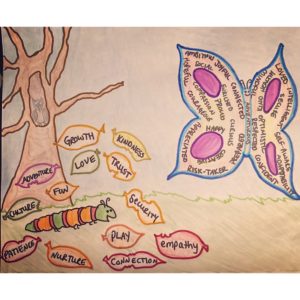
My Philosophy as an Early Childhood Educator
I believe that each child is a unique and capable individual and as an educator I will value and provide opportunities to develop each child’s cognitive, language, social-emotional, physical, and spiritual skills and abilities. A space that supports children through all five developmental domains is the key to every quality early learning environment.
I believe that children learn through play and observation. As an Educator, I will provide open-ended opportunities for children to explore the world around them, create the things they imagine, and let the children lead the way to play. I will create activities and plans based on the living inquiries of the BC Early Learning Framework.
The Reggio Emilia approach to childcare, which I find suits my philosophy the best, values the environment as the third teacher (Dietze & Kashin, 2016). My role as an Educator is to provide materials and experiences that are open-ended, inclusive, fun, and curious, all in an environment that is warm, and developmentally appropriate for all ages and stages of children in my care. The environment, both inside and outside, that I provide for the children will play a pivotal role in my planning.
My daughter motivates me every day to learn all I can and be the best teacher I can for her and all other children in my life. Watching her grow and develop, and absorb everything she was seeing around her made me want to be a part of that for other children. To be an educator, with the trust of children and their family to teach and guide them through their most formative years, is such a beautiful gift.
I believe in celebrating culture. I will value and acknowledge each child’s individual culture, and ethnic diversity. Every child should be celebrated for who they are and where they come from. The child’s family knows them better than anyone else, and I will honour that knowledge with open communication to build a strong relationship. I will welcome all families to visit and observe my centre at any time.
Philosopher Jean Piaget believed that children are egocentric, and that they are the centre of their own world. An article about the prevalence of principles Piaget’s theory in 4-7 year olds explains that “since the thinking of a child is different from that of adults, one cannot expect a child to process and utilize information in the same way that an adult would. Therefore, for efficient communication with a child, it is necessary to understand his/her intellectual level and the ways in which thought processes work at various stages” (Marwaha, Goswami, & Vashist, 2017). As an educator, I will acknowledge each child’s feelings and thoughts as their own, and hold space for those feelings when they need it. Trust, love, and security are vital to a child’s development. I will provide all of those things to children at my centre, while allowing them to explore, discover, and create at their own pace. These opportunities will allow the children to develop independence, become self-aware, and foster their self-esteem as they change from a pre-kindergarten caterpillar into a school-aged butterfly.
I vow to always continue to learn and grow with the children, and will look to my colleagues, mentors, friends and family, to encourage and support me on this path of Early Childhood Education.
References:
Dietze, B., & Kashin, D. (2016). Empowering pedagogy for early childhood education. Toronto, Ontario. Pearson Education Canada Inc.
Marwaha, S., Goswami, M., & Vashist, B. (2017). Prevalence of Principles of Piaget’s Theory Among 4-7-year-old Children and their Correlation with IQ. Journal of clinical and diagnostic research : JCDR, 11(8), ZC111–ZC115. https://doi.org/10.7860/JCDR/2017/28435.10513
Original Philosophy Reflections:
My vision for working with children is to support and empower children to be their own independent person.
In three years, I see my greatest strengths with children to be actively listening, and learning from them.
I envision the early learning environment as natural, inclusive, and open-ended.
I see children as unique individuals.
I view children’s families to be their most important supporters, and the most valuable source of information about a child.
I suspect that cultural diversity will become even more prevalent and important in years to come.
I envision my colleagues as friends, mentors, and supporters.

